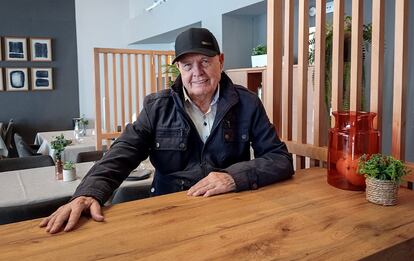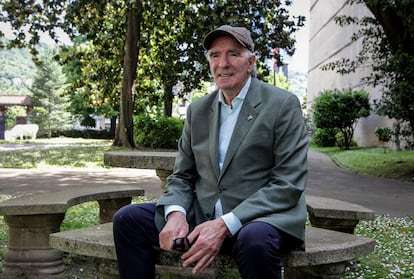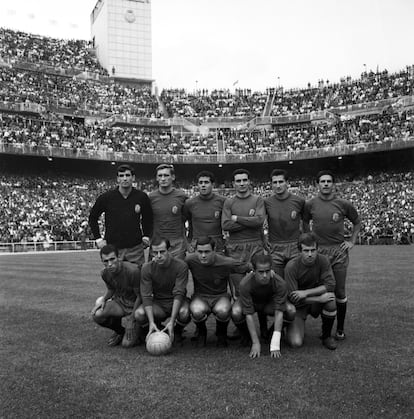60 years ago, on June 21, 1964, Spain won its first European Championship in the midst of Franco’s rule and against the Soviet Union at the Santiago Bernabéu. Of the 11 players who took the field in that event that the national team won (2-1), only two are still alive: the Galician Marcelino Martínez, member of the splendid front of the magnificent five in Real Zaragoza and author of the famous goal that scored the victory to Spain, and the Basque José Ángel Iribar, then a very young goalkeeper for Athletic. Both have helped us remember those moments that are only preserved in black and white.
In the cards from the 63-64 season, Chopo did not appear in the Athletic lineup, but rather Carmelo, who played in the 1962 World Cup, but ended up playing in Iribar and winning the European Championship. “Do you know what happened? That José Villalonga, the coach, knew me from playing for Basconia against Atlético de Madrid in the Cup, and we eliminated them in the playoff match. I think I convinced him there,” says Iribar; “The team had just conceded quite a few goals in the previous matches against Scotland and England. Then it was seen that he wanted to change, so young people came in.”
Marcelino also relives that generational change. “Lapetra was a playmaker, he had a real glove because technically he was a phenomenon. I dare to say that Spain, in terms of quality, never had a selection as impressive as that of 64″, he states emphatically. “It was a very young team, the oldest must have been Suárez. A team to have played and won the following World Cup, but there were problems because the Government influenced certain players to enter. And everything was different.”
The coach, Villalonga, was a military man. “Yes, but a very affable person. He was ahead of his time, especially when it came to physical preparation. He really liked athletics and applied it to soccer,” says Iribar. “He had a lot of influence in the preparation and he was also a great reader and very studious. I always remember him with a book under his arm.”
Marcelino became a figure of Zaragoza leaving the Santiago Seminary. “I was there and I loved playing. We had a great team, we managed to win a friendly against a Deportivo team. “I liked to play, but I didn’t think I could be a soccer player.” And priest? “Well, cure, yes. My father was really upset when I went to the seminary, but my mother was delighted because she was very religious. They wanted to send me to Rome to get my doctorate. And I just wanted to be in the seminary and if possible be a priest, but from the village.”
Iribar came to Athletic from Basconia. Within the family misfortune, he had a certain fortune. “I did not do military service because my father died shortly before and I was left as the son of a widow and the only boy. Then I think they also freed me for winning the European Championship.”

Marcelino, like Iribar, had the wet sand of his town’s beach as his first reference. “A coach from Racing de Ferrol, Galarraga, a Basque, came to see me play on the beach. He had previously trained with Deportivo and with Celta, he was 14 years old and was in the seminary. In the end I ended up in Racing without earning a penny. I was 18 years old, I was studying Industrials and the club gave me a private teacher to make up the classes I missed while traveling because when you were already in Second Division you went to the other side of Spain and lost three days. But that was when Zaragoza started to see me.”
And then, the selection for both. “I remember we went to La Berzosa (Madrid),” Iribar recalls. “It was a place where the selection was always concentrated. And well, I think that in the middle of the season was the first contact. It was a very quiet place. We had to carry a book, because there were no other things. “Reading and walks in the mountains.” Marcelino also remembers La Berzosa. “I got along wonderfully with Luis Suárez. We were concentrated there and there was only one phone and while he was having a massage he asked me to call his girlfriend on the phone and talk to her while he finished. And so no one picked up his phone.” “To train we went to Madrid, which was an hour and a half away,” adds Iribar.
Like Marcelino, Chopo made friends at the rallies. “I met people who later became friends for life. We were already coming from those games in which I started playing, and that’s where this new generation of footballers was formed.”

Marcelino discovered Iribar there. “He was very young, very loved. We got along very well. He is a noble Basque, rather shy. He is not a dry Basque, he is a serious Basque. I always told him that they had to make a monument for him. And, look, they have done it.”
The final phase matches have arrived, all in Spain. “The semi-final was against Hungary at the Bernabéu, and we won in extra time. I had a lot of work in the last minutes and it turned out well,” Iribar recalls.
And the final arrived, on June 21. With Franco in the box. “Four years before, Spain had withdrawn,” says Marcelino. “That was a political problem, we focused on football. What we told them was that either we played or we didn’t return to the national team. We players were beginning to have some power, some like Suárez had already gone to play abroad.” Marcelino adds: “We played in blue because Russia had the right to wear red, but the players imposed themselves because they wanted us to dress in white like Madrid. And we told them no kidding. In white and at the Bernábeu? So far we have come”.
In front, in goal, Yashin, “who was an icon with a well-earned fame. They had given him the Ballon d’Or as a goalkeeper. In relation to those of his time, he was a very modern goalkeeper, because he did everything well,” analyzes Iribar. “So the technique was not so refined.” Marcelino also praises the Soviet goalkeeper: “He was a great goalkeeper, but he didn’t think much about it. For me, the best goalkeeper I have seen is Iribar.”

Chopo says that “the atmosphere was incredible. There were 110,000 people at the Bernabéu, almost all of them standing, of course. And that was very imposing.” And there was communism, of course. “Well, yes, it was demons. With a tail and all that. “They were drawn like that in newspaper cartoons.” Marcelino believes that “Russia was a technically very good team and athletes. They trained eight hours a day! Before with the national team you played three or four games a year, but they got together more than us. The selection was what they took care of the most.”
Spain took the lead with a goal from Pereda in the sixth minute. “From the center of the field up, we had very unbalanced players. There were Amancio, Suárez, Lapetra, Marcelino, and also Pereda, who was the author of the second goal’s cross. Then we had a lot of friendship. He always told me the same thing: ‘I should have played for Athletic.’
The USSR tied with a goal from Jusainov two minutes later. Marcelino intervenes: “In an interview, Iribar said that the goal that Russia scored against us in the final was his fault and that thank goodness I saved him in the end. Come on, go to hell! Iribar stopped a lot. And that ball they gave him was very difficult.” Everything remained the same, until Pereda’s cross in the 84th minute, and Marcelino’s header. “I learned to head the ball on the beach, here in Ares,” he admits. “We played like volleyball, with a net in the middle and I jumped to hit it with a header.” He applied his knowledge. “As I was situated, I already saw that it was going to be a goal. Pereda went to the sideline and centered the ball with outward spin, the ball was a little behind me. I knew he was going to nail Yashin down below. He didn’t give him time to jump.”
Iribar then saw the Cup in his hands. “When Marcelino scored, we already thought we were going to win. They pushed us a little, but mostly with aerial balls and crosses, but we defended very well.”
Then the celebration, “which was very simple. We experienced the joy in the locker room,” Iribar recalls. “Then we left the field calmly, went to the hotel, had dinner there and they gave us permission to leave and we went partying at night.”
The next day, the visit to El Pardo, to be received by Franco. “I didn’t like those things,” says Marcelino. “I was very angry because the Government influenced the selection. There was that Elola Olaso and he was the one who pulled those strings. They wanted players from Madrid and Barcelona to be in the team. From Barça because Franco was still a little afraid of them. But I wasn’t afraid of Zaragoza.”
“They told us that we had to dress up,” confesses Iribar. “We asked what that was and they told us it was a black suit. I had a gray Prince of Wales and I arrived last, with Pereda, looking for a black suit. They had told us where they rented them and we went to see if we could get any and nothing, none of them fit me. “I went with what I had.”
You can follow The USA Print in Facebook and xor sign up here to receive our weekly newsletter.
_



